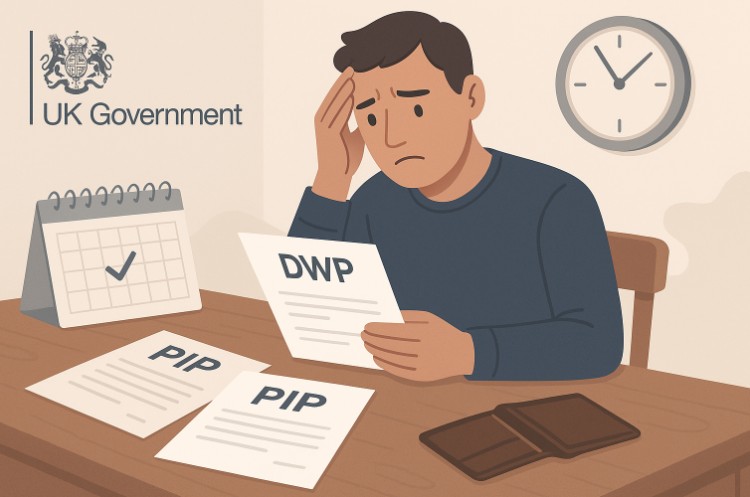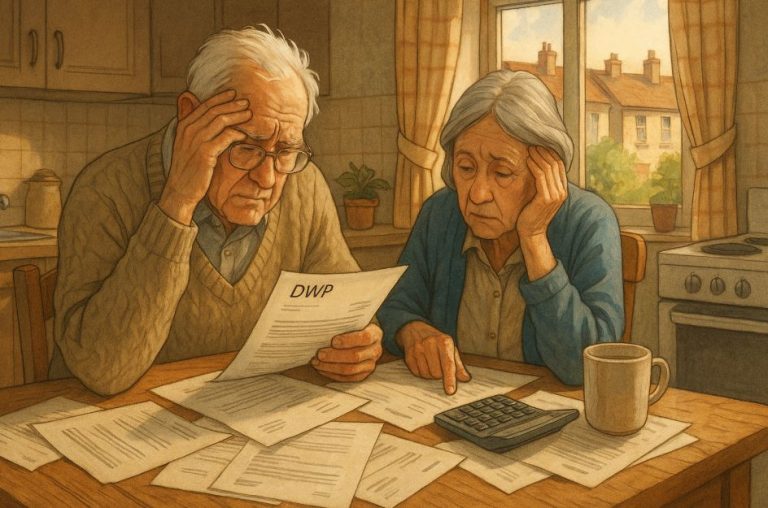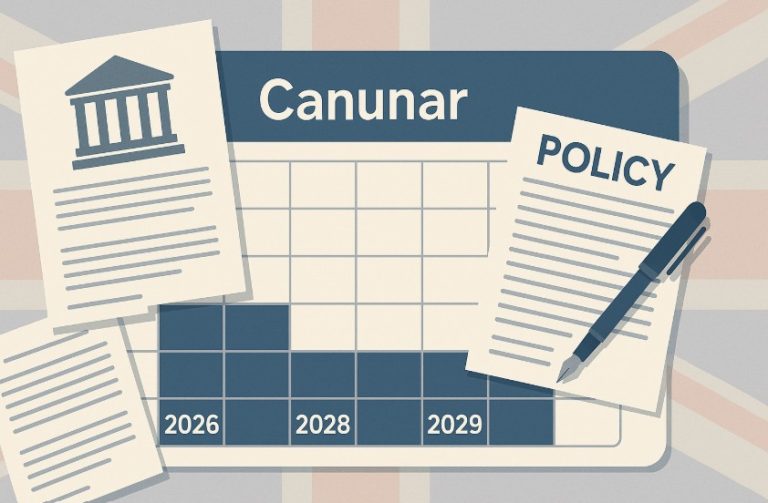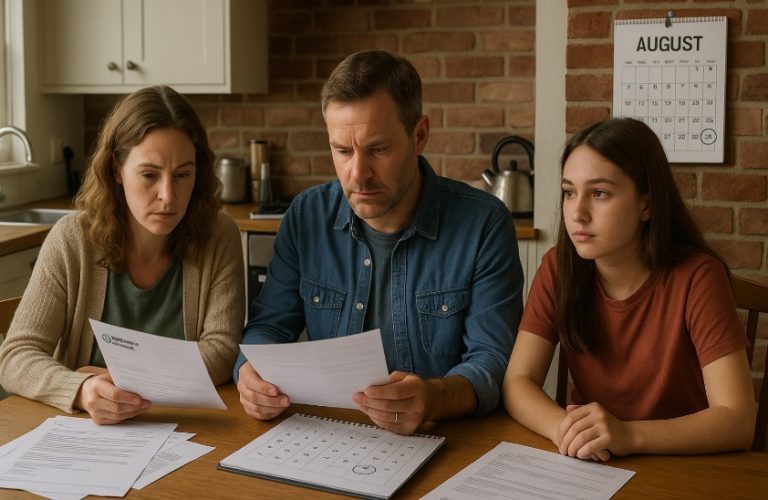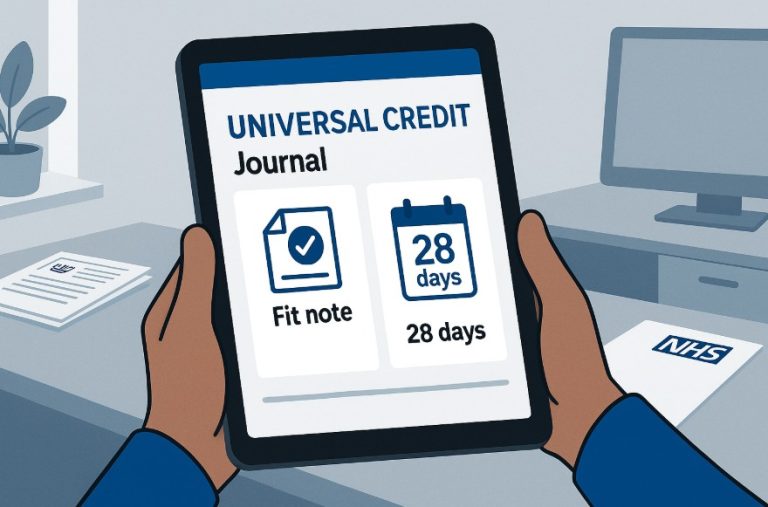The Department for Work and Pensions (DWP) is actively sending migration notice letters to individuals receiving four key legacy benefits.
This is part of the government’s managed migration to Universal Credit, designed to simplify the benefits system across the UK.
Claimants of income-related ESA, Income Support, income-based JSA, and Housing Benefit must respond to these letters by the deadline provided.
Failing to act could result in the loss of existing benefits and potential entitlement under the new system.
What Is the DWP’s Plan for Migrating Legacy Benefit Claimants to Universal Credit?
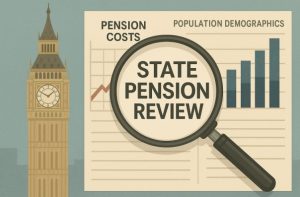
The Department for Work and Pensions (DWP) began the process of moving all legacy benefit recipients to Universal Credit through a system known as managed migration. This transition formally started in May 2022.
The plan is to complete the full migration by March 2026, by which time legacy benefits will be phased out entirely.
The government previously migrated claimants of Working Tax Credit and Child Tax Credit. Attention has now shifted to those still receiving four other legacy benefits.
These individuals will begin to receive letters called migration notices, instructing them to switch to Universal Credit.
The aim of this process is to bring all benefits under one simplified digital system. Claimants need to act on the letter once received, as their current payments will stop regardless of whether they apply for Universal Credit.
The DWP intends to send all remaining migration notices by the end of 2025. As Universal Credit becomes the default system, the onus lies with the claimant to initiate their application based on the instructions in the migration letter.
Which Four Legacy Benefits Are Affected by the Universal Credit Migration?
The four remaining legacy benefits being replaced by Universal Credit are:
- Income-related Employment and Support Allowance (ESA)
- Income Support
- Income-based Jobseeker’s Allowance (JSA)
- Housing Benefit (for those of working age)
These benefits are being absorbed into the Universal Credit framework to ensure a consistent approach to welfare delivery across the UK.
The move means that claimants receiving any of these four legacy benefits will no longer receive them once their migration deadline passes.
Universal Credit incorporates these payments into a single monthly amount based on a person’s circumstances.
The table below outlines how the legacy benefits are replaced by Universal Credit:
| Legacy Benefit | Replaced By | Included in UC? |
| Income-related ESA | Universal Credit | Yes |
| Income Support | Universal Credit | Yes |
| Income-based JSA | Universal Credit | Yes |
| Housing Benefit (working age) | Universal Credit | Yes |
Universal Credit does not simply replace benefits at face value. Instead, it calculates entitlement based on income, rent costs, disability, and number of dependents.
Therefore, some people may find their payments differ from what they received under legacy schemes.
What Should You Do If You Receive a Migration Notice Letter from the DWP?
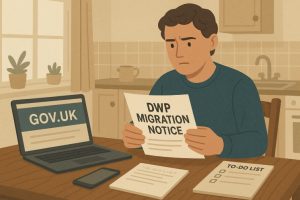
When the Department for Work and Pensions (DWP) issues a migration notice letter, it signals the beginning of your transition from legacy benefits to Universal Credit.
The letter is more than just information; it outlines a specific timeline and necessary actions that must be taken to avoid disruption in payments.
Understand the Contents of the Letter
The migration notice letter includes key details that should not be overlooked:
- The exact deadline by which you must submit your Universal Credit claim
- Your National Insurance number and instructions to begin the claim
- A reminder that failing to claim by the deadline will result in a termination of current benefits
- Information about transitional protection eligibility
This letter is legally binding and should be treated as a formal notice. No automatic transition occurs — action is required from the claimant.
Start Your Universal Credit Application
You can begin your Universal Credit application either online or by phone. It’s important to act quickly once you receive the letter.
- Online: Visit GOV.UK to set up your Universal Credit account.
- Phone: If you are unable to apply online, call the Universal Credit Migration Notice Helpline at 0800 169 0328 for support.
You have 28 days from when you create your account to complete your application. Failure to submit the full claim within this timeframe can delay your payment or affect your eligibility for transitional protection.
Verify Your Details Accurately
When applying for Universal Credit:
- Report your current income and savings accurately
- Include household information such as dependents, rent, and employment status
- Upload any required identification documents
Errors or omissions can cause delays in processing or may lead to reduced entitlement. It is advisable to review all entries before submitting the claim.
Seek Help if Needed
If you’re unsure how to complete the process or are facing personal difficulties, support is available:
- Citizens Advice Help to Claim service offers free assistance
- Jobcentre Plus can guide you through the application process
- The Migration Notice Helpline can answer questions specific to your letter
Acting before your deadline gives you time to resolve any issues without risking a lapse in benefit payments.
What Is Transitional Protection and Who Is Eligible?
Transitional protection is a financial safeguard provided by the DWP to ensure that claimants moving from legacy benefits to Universal Credit through managed migration do not receive less money immediately after switching.
This protection acts as a temporary financial top-up, helping individuals adjust to the new system without an immediate loss of income.
What Does Transitional Protection Cover?
Transitional protection is calculated as the difference between the total amount you received under legacy benefits and your new Universal Credit entitlement. This top-up is paid in addition to your calculated Universal Credit amount.
Here’s an example scenario:
| Legacy Benefit Total | Calculated UC Entitlement | Transitional Top-Up | Total UC Payment |
| £140.55 (ESA) | £100 | £40.55 | £140.55 |
This protection ensures that your Universal Credit award matches your previous benefit total, at least initially.
Who Qualifies for Transitional Protection?
To qualify for transitional protection, you must meet all the following conditions:
- You receive a migration notice from the DWP
- You apply for Universal Credit before the deadline stated in the letter
- You do not have a significant change in circumstances before or during the transition
- You complete your Universal Credit application within 28 days of creating your account
Significant changes that can disqualify you from transitional protection include:
- Moving in with a partner
- Separating from a partner
- Starting a job or increasing working hours
- Changes in household composition (such as a child leaving home)
How Long Does Transitional Protection Last?

Transitional protection is not permanent. It remains in place until:
- Your Universal Credit entitlement increases to a level that naturally matches or exceeds your previous benefit amount
- You experience a significant change in circumstances
- You become ineligible for Universal Credit
The top-up amount will not increase with benefit uprating, which means it remains fixed unless your circumstances change.
Over time, inflation and other changes may cause your base Universal Credit entitlement to grow, at which point the transitional element is phased out.
Why Is Transitional Protection Important?
This financial protection is designed to ensure a fair transition to the new benefit system. Many claimants would otherwise lose out due to differences in how Universal Credit is assessed compared to legacy benefits.
Key benefits of transitional protection:
- Prevents a sudden drop in income
- Gives time for households to adjust to monthly budgeting
- Reduces financial stress during the transition period
Claimants should prioritise applying before the deadline in their migration notice to secure this safeguard.
Once the deadline has passed, there is no entitlement to transitional protection, even if you are otherwise eligible for Universal Credit.
How Can You Apply for Universal Credit During the Migration?
The DWP offers two main channels for claimants to apply for Universal Credit after receiving their migration notice.
1. Online Application
- Visit the official Universal Credit page on GOV.UK
- Create a Universal Credit account using your personal details
- Submit the application within 28 days from account creation
2. Phone Application
- Contact the Universal Credit Migration Notice Helpline at 0800 169 0328
- This option is particularly useful for those who are not comfortable applying online or have accessibility needs
Once a Universal Credit claim is submitted and approved, all legacy benefits being received will cease.
Payments under Universal Credit will typically begin five weeks after the claim is accepted, known as the assessment period.
It’s also possible to apply for an advance payment if the claimant cannot wait five weeks. However, this advance is repayable in instalments from future Universal Credit payments.
What Happens If You Miss the Deadline to Claim Universal Credit?
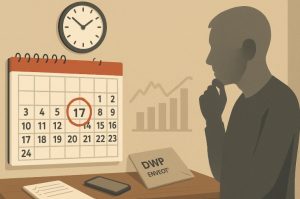
Failing to act by the deadline in the migration letter can result in the automatic ending of existing benefits.
The DWP does not carry out the migration on your behalf. The responsibility rests with the claimant to apply for Universal Credit on time.
Claimants who are unable to meet the deadline due to valid reasons such as illness, family emergencies, or accessibility challenges may contact the Migration Notice Helpline.
If the DWP accepts the reason, they may offer an extension, allowing additional time to apply.
Missing the deadline without any contact or valid justification will lead to the loss of:
- Existing benefit payments
- Transitional protection eligibility
- Potential backdated payments
For this reason, contacting the DWP before the deadline is critical for anyone facing delays or personal barriers to applying.
How Will Future Changes Impact Claimants After the Migration?
The government’s planned reforms under the upcoming Universal Credit and Personal Independence Payment Bill will introduce major changes from April 2026.
One of the most significant changes will be the reduction and freezing of the health component for new Universal Credit claimants.
These changes will not affect those who have already claimed Universal Credit before April 2026. Current and future transitional protection arrangements will apply only to those who migrate before the law changes.
Claimants who transition early will benefit from:
- Continuation of full health-related components
- Preservation of transitional top-up protections
- Exemption from post-2026 reduction in health support rates
This provides a strong incentive for claimants to act promptly if they receive a migration notice before 2026.
What Help Is Available for People Struggling with the Move to Universal Credit?
The government and external organisations are providing targeted support to ease the burden of the migration process.
Support options include:
- The Citizens Advice Help to Claim service for free, independent guidance
- Jobcentre Plus advisors for personalised in-branch or phone support
- The Migration Notice Helpline for migration-specific advice
- The Budgeting Advance feature within Universal Credit for those needing upfront financial help
In addition, the DWP has partnered with local charities and community centres to guide vulnerable individuals through the Universal Credit application process.
Some local authorities also offer digital access centres and benefits clinics to assist those without internet or device access.
How Does Universal Credit Compare to the Legacy Benefits Being Replaced?
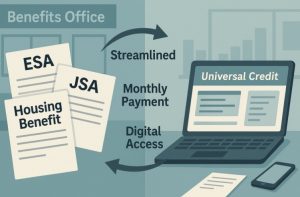
Understanding how Universal Credit compares to legacy benefits is important for those concerned about the changes.
The most notable difference is that Universal Credit is calculated monthly and adjusts based on real-time income data, while legacy benefits were paid weekly or fortnightly and assessed annually or semi-annually.
The table below outlines key differences between the systems:
| Feature | Legacy Benefits | Universal Credit |
| Application Process | Multiple separate claims | One integrated claim |
| Payment Frequency | Weekly/Fortnightly | Monthly |
| Income Assessment | Periodic | Monthly (real-time) |
| Change in Circumstances | Reported separately per benefit | One update applies to all components |
| Housing Costs | Paid directly to landlord in many cases | Usually paid to claimant |
| Digital Access | Mostly paper-based or phone | Online-first approach |
The structure of Universal Credit offers more flexibility and real-time adjustments but can be challenging for those unfamiliar with digital systems or those who prefer frequent payments.
Conclusion
The shift from legacy benefits to Universal Credit represents a major change in the UK’s welfare system.
Claimants who receive a migration notice must take timely action to avoid disruption in their payments and to retain eligibility for transitional protection.
Understanding the process, deadlines, and support available is essential. With all migration letters expected to be issued by the end of 2025, prompt responses will ensure claimants remain financially secure throughout the transition and beyond into the new benefits structure.
FAQs About the Universal Credit Migration Letters and Process
What is a DWP migration notice letter?
A migration notice is an official letter sent by the DWP to inform legacy benefit claimants that they must move to Universal Credit by a specific date.
Can I claim Universal Credit before receiving a migration letter?
Yes, but if you claim before receiving a migration notice, you won’t qualify for transitional protection.
What happens to my existing benefits once I apply?
They will stop as soon as your Universal Credit claim is processed and accepted.
Will transitional protection last forever?
No. It remains in place until your circumstances significantly change or until Universal Credit payments naturally exceed your previous benefit levels.
Is there a deadline to complete a Universal Credit application?
Yes. Once you begin your application, you have 28 days to complete it.
Can I appeal if I lose my benefits for missing the migration deadline?
You may not be able to appeal, but contacting the DWP with valid reasons might grant you an extension.
How long does it take to receive the first Universal Credit payment?
Most claimants receive their first payment within five weeks of submitting the application.
Source – https://www.mirror.co.uk/money/brits-who-four-benefits-warned-35563386


